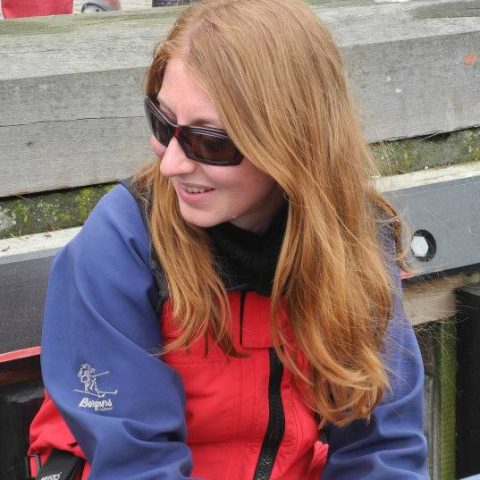Sinéad, this is the last week for Danish submissions at SmokeLong. Thank you so much for being part of the Global Flash Series. What kind of story have you been looking for?
It has been great to be part of a global series that encourages emerging authors. I suppose, I’m looking for a story that’s going to challenge me a bit as a translator. I love translating pieces that make me think about language.
What are the challenges of translating Danish to English?
One challenge is definitely Danglish! Danish and English are quite close and a lot of, for example, idioms can be directly translated, but that’s where the danger lies – you can end up translating something into English that doesn’t sound quite right, but you can’t quite pinpoint what it is exactly. That’s also why I like to leave a translation for a few days, at least, and then return to it with fresh eyes and ears.
And another one is the literal descriptiveness of Danish – take ‘lawnmower’ – in Danish it’s “græsslåmaskine” – “grass hitting machine” or ‘head and tail wind’ – “medvind” (with wind) and “modwind” (against [you] wind). It’s quite literal. Most English translations end up being a good bit longer than the Danish original, because it’s so easy to form these ‘literal’ compound words in Danish – that was definitely a challenge for me when I was translating Arnulf – a Viking Saga – not only was it written in the style of the sagas, but the author, Susanne Clod Pedersen, has an amazing ability to form compound words, which sometimes had to be translated into whole sentences in themselves to really capture that descriptiveness. We worked long and hard together on getting her style right in English.
What are you working on at the moment?
My most recent projects were The Mysterious Brain (Bonnier), Mindful Leadership for the Modern Worker (Stine Marcinkowski) and Hygge: The Danish Art of Happiness by Marie Tourell Søderberg (Penguin).
At the moment, I’m finishing up a book called Bodily Intelligence by Kristoffer Glavind Kjær, who founded the Manuvision holistic body therapy system. Bodily Intelligence is a kind of practical manual for looking deeper at the issues we hold on to in our bodies and Kristoffer offers suggestions for how we can begin to resolve those issues – it’s not just about posture. He explores issues such as free will, love and happiness, too.
Apart from that I’m translating a book by Katrine Pedersen, Phono sapiens – it’s a fascinating look at technology, Big Data and how we have gone from being Homo sapiens to Phono sapiens.
I’m also working on an unbelievable ‘based-on-a-true-story’ novel called A Pram in New York about a Danish woman who travelled to New York with her 14-month-old daughter and ended up being arrested and having her daughter placed with child services, because she had allowed her daughter to sleep in her pram outside a café, while she was inside – which is the norm here in Scandinavia.
What Danish authors should we be reading?
Well, if you like Nordic Noir, then you can’t go wrong with Jussi Adler-Olsen and his Department Q series.
Over the holidays, I enjoyed Puk Damsgård’s Ser du månen, Daniel (The Isis Hostage) – translated by my good colleague, David Young; Tom Buk-Swienty’s Tommy & Tanne, the story of Thomas Dinesen and his sister Karen Blixen and Maria Helleberg’s Kvinderne fra Thy – a novel about a mother and daughter trying to make life better for themselves in Thy, northwest Jutland (though I don’t think either of them have been translated – yet).
Oh, and Dorthe Nors is brilliant. She’s definitely one to read.
Do you live in Denmark now? Are the Danes really the happiest people in the world?
Yep, I live in Denmark – in a little village of 300 people in northern Zealand – and I would definitely say that it is a very happy placed to live and it has a great sense of community. It’s a very lively village. But it’s a tricky question – statistically the Danes are the happiest people in the world, but statistically they also rank number 2 on the list of countries taking anti-depressants per capita… They are a happy people and a lot of it comes down to mindset and work-life balance. We’ve nearly all heard about ‘hygge’ now – it’s about a lot more than just cosying up to the fire with hot chocolate and wool socks – it’s a mindset about being present with family and friends, people you care about, and not taking yourself too seriously. The better work-life balance in Denmark also helps – I think, at the last count, we work an average of 35 hours a week in Denmark. Making time for family and friends is a priority.


 The core workshop of SmokeLong Fitness is all in writing, so you can take part from anywhere at anytime. We are excited about creating a supportive, consistent and structured environment for flash writers to work on their craft in a community. We are thrilled and proud to say that our workshop participants have won, placed, or been listed in every major flash competition. Community works.
The core workshop of SmokeLong Fitness is all in writing, so you can take part from anywhere at anytime. We are excited about creating a supportive, consistent and structured environment for flash writers to work on their craft in a community. We are thrilled and proud to say that our workshop participants have won, placed, or been listed in every major flash competition. Community works.